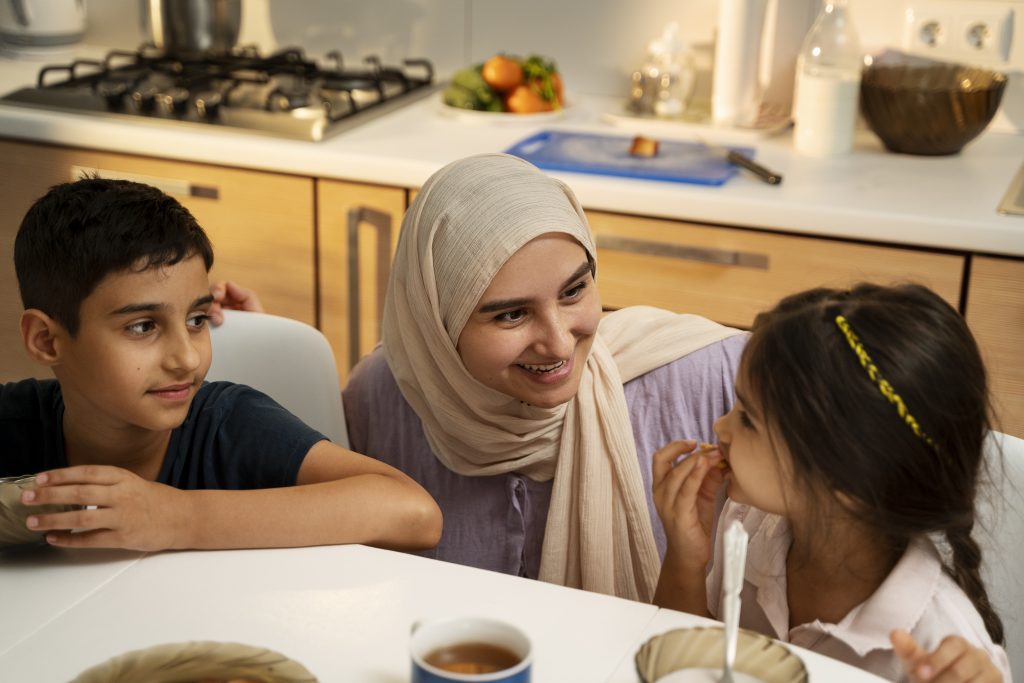Looking to introduce your children to fasting during Ramadan? Explore these helpful tips tailored to ensure a positive fasting experience for your children!

Ramadan is the month when all Muslims around the world observe a strict fast from dawn until sunset. It is both an act of worship and a form of spiritual discipline, serving to empathise with those less fortunate.
Fasting can be an excellent method for instilling positive habits in your children, though it may initially seem daunting and challenging. Explore the following tips to support your children on their spiritual journey!
Introduce half-day fasting or meal skipping
It’s crucial to introduce your children to fasting in a safe and healthy manner. Unlike adults who are accustomed to longer fasting hours, children may struggle with thirst and hunger throughout the fasting period. You can gradually introduce them to the concept of fasting by starting with half-day fasting or meal skipping. Customise their break at a specific time, and gradually increase the duration as your children become more accustomed and ready.
Moreover, it is important to keep an eye on their fatigue levels. If they experience tiredness and exhaustion while fasting, they should stop fasting immediately. Remember that every child is different and do not push them beyond their capacity as you do not want them to associate Ramadan with anxiety or stress. Practice makes perfect and a little step goes a long way and can contribute to your children’s ability to enjoy fasting!
Drink plenty of water
Another important fasting tip for your children is to ensure that they drink plenty of water to avoid dehydration. Keeping your children hydrated is essential during the fasting period, as they may feel thirstier than usual. For suhur, consider refraining from offering your children salty foods that might make them feel thirsty. Opting for less salty foods can help ensure that your children stay hydrated and comfortable throughout the fasting period.
Instead, focus on providing nourishing and hydrating options such as fruits, vegetables, whole grains, and proteins to sustain their energy levels and keep them feeling satisfied until iftar. It is essential to monitor your child’s energy levels, especially if they are expending a lot of energy at school. This can help prevent them from becoming excessively tired or exhausted.
Get your children involved
What better way to introduce your children to fasting is to get them involved in meal planning for sahur and iftar. By involving them in the planning process, you not only teach them about the significance of these meals during Ramadan but also empower them to make healthy and balanced food choices.
For sahur, you can guide them to plan meals that are nutritious and balanced, which helps to keep them energised for the entire day. Similarly, for iftar, you can get them involved in what dishes to prepare. This can be a wonderful opportunity for them to explore different recipes and cuisines. Additionally, you can also take your children to the local bazar and introduce them to the variety of traditional food and drinks.
By involving your children in meal planning for both sahur and iftar, your children will learn the importance of balanced nutrition during Ramadan and instill valuable skills related to meal preparation and healthy eating habits. This involvement can make fasting a more enjoyable and meaningful experience for them, fostering a sense of ownership and responsibility during this holy month.
Lead by example
Finally, the most crucial tip for guiding your children through fasting during Ramadan is to set positive examples. For example, you can motivate them to engage in charitable deeds, cultivate positive behaviours like helping others, and provide them with exemplary role models.
Furthermore, you can explain the significance of fasting to them and highlight the importance of the holy month by utilising engaging and interactive graphics and relevant stories, fostering both motivation and curiosity in them. By setting positive examples, you can guide your children, providing them with practical steps they can follow.

Ramadan not only fosters compassion towards the less fortunate but also inspires the performance of honourable deeds, which serves good examples for children to follow. While fasting offers numerous benefits, it is essential to ensure that your children fast according to their individual capabilities and needs.
This means considering their age, health, and ability to abstain from food and drink for extended periods. It is crucial to prioritise their well-being and avoid pushing them beyond their limits, while still encouraging them to participate. This approach not only fosters a positive experience of Ramadan for them but also promotes their overall health and development.
